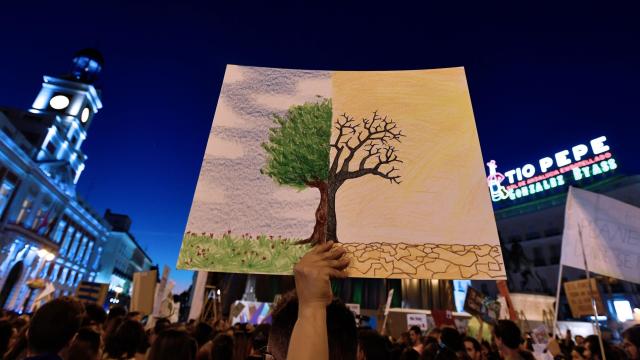The latest Intergovernmental Panel on Climate Change report is here.
Reading what is by and large a dispassionate scientific report led to a lot of emotions. While other IPCC reports — notably, the groups’ 2018 report about limiting heating to the 1.5-degree-Celsius target — have made me feel downright depressed, this one had a somewhat different impact.
Yes, the report has all the hallmarks you’ve come to expect from climate reports: The climate crisis is happening faster than expected, irreversible tipping points are on the horizon, and the timeline is now more compressed than ever to wind down fossil fuel use. The report is a “code red for humanity,” as United Nations Secretary-General António Guterres put it. But what’s different now isn’t necessarily what’s in the report. It’s what’s happening beyond its pages, in society itself.
Meteorologist and Currently founder Eric Holthaus has a phrase he uses often noting “you were born at just the right moment to change everything.” My instant reaction is usually to shy away from mushy sentiments for fear of seeming naive. But as I read the report, I couldn’t help but realise that yes, this is exactly right. This moment isn’t simply perilous — it’s an opportunity.
Consider the last major IPCC report, published in 2014. The science of attributing extreme weather to climate change was in its infancy. The impacts were seen as more down the road. The climate movement consisted largely of white environmental groups. All of that is now changing by the day.
Fast forward to the current IPCC, and the language is much more stark and clear. The human impact on the climate is “unequivocal,” and the planet has warmed over the past 50 years at a rate faster than anything in at least the past 2,000 years — and likely much longer. But more daunting is what’s happening this very summer.
The impacts of the tectonic shifts the IPCC has documented are everywhere. You can see it in the floods that have torn across multiple continents and the morgues full of those who died in unprecedented heat. You can smell it in the morning air as smoke wafted thousands of miles from wildfires large enough to see from space. We are living in an emergency.
In the past two years, a coalition of advocates has also come together with goals that extend beyond saving the rainforest. They want to restore land rights to Indigenous groups, protect Black and brown people from suffering the most, kick Big Oil’s lying arse, and save the rainforest. This is a movement that is ready to fight like hell for something different.
“We can’t afford burnout,” Georgia Wright, the host of Inherited, a podcast about the youth climate movement, wrote in Hot Take this weekend. “We’re in this bitch for the long haul.”
Make no mistake that there are powerful forces aligned against that change. There are those who aim to preserve existing hierarchies and an economy based on the extraction of oil. Of wealth. Of dignity. And they will fight like hell, too. Those forces were around during past IPCC reports. The difference now, though, is that they are weaker than ever.
“When that first domino falls — and I’m pretty brashly confident that we’re powerful enough to push the fucking thing over ASAP — it’s going to be a moment in history like nothing else. It’s going to happen in slow motion but when we’re old, we’ll remember it as a millisecond,” Ketan Joshi, an energy analyst, said in a tweet about ending the coal industry and fossil fuel use as a whole. That proclamation has been rattling around my brain for weeks.
Nothing is a given, of course. The IPCC uses what it calls “pathways” to model the climate. They’re basically stories about the world as it could be, and how that impacts the climate. There’s one where global society fractures further and the rich horde wealth. In that one, the planet heats up to unimaginable levels and causes immense suffering for hundreds of millions, if not billions of people.
There’s another, though, where the world turns a page towards a more just future, competition gives way to cooperation, and technology and knowledge are shared and co-created for the benefit of all. Mushy? Sure — but it’s only naive if we fail to meet the moment, which is entirely in our control.
Never have more people been lining up to fight for a better future. And there have never been more ways to fight — or more of a need to do so. There are pitched protests against pipelines you can throw your lot in with or even good old-fashioned call-your-representative campaigns. Fight to turn prisons into solar farms. Fight for regular people to get elected to Congress. Fight for Jeff Bezos to pay his damn taxes. Fight for literally any of these 76 solutions to the climate crisis we have now. Even in the good future, we’ll still deal with climate impacts that will reverberate for centuries. Fight to help those most vulnerable.
The beauty of the climate movement’s growth and the urgency of the crisis means there is no shortage of ways to affect change. But there is an increasing shortage of time. That’s why now is exactly the right time to get started.
